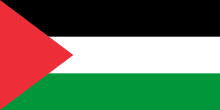|
Palestine at the 1996 Summer Olympics
Palestine participated at the 1996 Summer Olympics in Atlanta, United States, from 19 July to 4 August 1996. The Palestinian delegation at the 1996 Games included two athletes, runners Majed Abu Maraheel and Ihab Salama, and one official, Muammar Bississo, the president of the Palestine Olympic Committee. After forming an Olympic Committee in the 1930s but not competing to avoid Nazi persecution at the 1936 Olympic Games, the nation competed at the Olympic Games for the first time at these Games. Abu Maraheel then competed in his event and became the first Palestinian athlete to compete at the Olympic Games. He finished last in his heat and did not advance to the finals. Abu Maraheel was also the flag bearer during the parade of nations of the opening ceremony. BackgroundMembership and recognitionA multi-ethnic Palestinian Olympic Committee (including both Jewish and Arab athletes) had been recognized by the International Olympic Committee (IOC) in 1931, but was unable to participate in the 1936 Berlin Summer Olympics due to Nazi persecution of all Jews, including those living in Palestine.[1] The recognition of the committee lasted until 1967, when the Six-Day War ensued and Israel gained control of Judea and Samaria from Jordan. The IOC extended recognition to the Palestine Olympic Committee (POC) in 1993, following the ratification of the Oslo Accords.[2] The decision of the recognition and participation of the nation was protested by Israel, who was refused membership to the Olympic Council of Asia in 1982. The president of the Olympic Committee of Israel (OCI) called it political propaganda and vowed to protest the decision to the IOC.[3] Palestine, sponsored by the Palestinian Authority, was then eventually allowed to compete at the 1996 Summer Olympic Games in Atlanta, Georgia, United States, becoming the first Palestinian Olympic team to compete in any of the Games.[1] DelegationAccording to the New York Times, a Palestinian sports official at the 1994 Asian Games held in Hiroshima, Japan, stated that the delegation hoped to send around 20 athletes. A year later, the estimate of the athletes to be sent dropped down to six.[4] In the year when the Olympic Games were going to be held, Nahil Mabrouk, the president of the Palestinian Track and Field Federation, stated that they aimed to send three athletes: long-distance runner Majed Abu Maraheel, racewalker Yasser Ali-Dib, who had emigrated to Cairo and was a bronze medalist at the 1995 Arab Athletics Championships in Cairo, Egypt,[5] and a female athlete who was going to be chosen by the West Bank branch of the national Olympic committee.[4] According to Muammar Bississo, the president of the Palestine Olympic Committee at the time, the delegation could have reached up to 40 athletes, but the government of Israel would not approve the necessary documents for the other Palestinian athletes to compete at the Games. This forced the delegation to supply two athletes: Majed Abu Maraheel, a runner and security guard for Force 17,[6][7] who would compete in the men's 10,000 metres event, and Ihab Salama, a football player for the Palestine national football team who was set to compete in the men's 5000 metres as the rest of his team were not allowed to compete at the Games.[8] However, Salama eventually did not compete in his event for unknown reasons.[9] Opening ceremony
Majed Abu Maraheel, interview with The Spokesman-Review[10]
At the opening ceremony for the 1996 Summer Olympics, Majed Abu Maraheel was chosen to be the first ever flag bearer for Palestine at the Olympic Games. He stated that his main purpose in the Games was "to remind the world that Palestine exists."[10] Relationships between the OCI and POC were fairly amicable during the Games, with respective committee presidents Ephraim Zinger and Muammar Bississo meeting during the opening ceremonies. The OCI officially rebuked Israeli governmental opposition to the POC competing under the name "Palestine", and Zinger extended an invitation for the Palestinian delegation to visit the OCI headquarters in Tel Aviv. Abu Maraheel and Ihab Salama shook hands, traded pins, and posed for photos with members of the Israeli delegation during the ceremony.[11] Athletics Following Salama's withdrawal from his event, Abu Maraheel eventually competed in his own event.[12] He competed in the men's 10,000 metres event on 26 July. Majed competed in the first heat with 24 other athletes. He finished last out of 21 athletes that finished the race,[b] and recorded a time of 34 minutes and 40.50 seconds. Colombia's Herder Vázquez placed ahead of him with a time of 33 minutes and 26.15 seconds, in a heat led by Ethiopia's Worku Bikila who posted a time of 27 minutes and 50.57 seconds, 6 minutes and 49.93 seconds quicker than Majed's time. Out of 48 athletes, Majed ranked last out of 42 athletes that finished.[c] He was over 6 minutes behind the slowest athlete that progressed to the finals. He did not progress to the later rounds.[13]
See alsoNotes
ReferencesCitations
Bibliography
External links |
||||||||||||||||||||||||||||||||||||||||||||||
